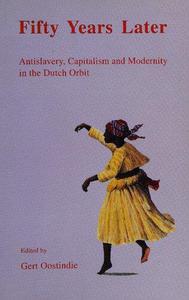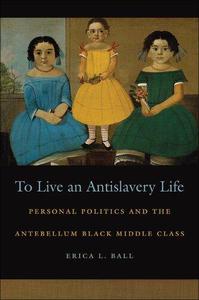- Книги
- 2-02-2023, 01:04
- 117
- 0
- voska89

Fifty Years Later: Antislavery, Capitalism and Modernity in the Dutch Orbit By Gert Oostindie; Seymour Drescher
1996 | 272 Pages | ISBN: 0822955873 | PDF | 19 MB
The Dutch slave trade, slavery and abolitionism have long remained unduly neglected issues in the burgeoning international debate on capitalism, modernity, and antislavery. Fifty Years Later now offers a thorough and wide-ranging discussion of antislavery in the Netherlands and in the Dutch colonial world, and also provides a fresh contribution to the ongoing debate on the relationship between abolitionism and economic, political and cultural modernization in the Western world at large. The contributors to this volume are Seymour Drescher, Pieter C. Emmer, Stanley L. Engerman, Edwin Horlings, Gerrit J. Knaap, Maarten Kuitenbrouwer, Gert Oostindie, Robert Ross, Angelie Sens, and Alex van Stipriaan.
Полная новость
- Книги
- 30-01-2023, 06:49
- 113
- 0
- voska89

To Live an Antislavery Life: Personal Politics and the Antebellum Black Middle Class By Erica L. Ball
2012 | 200 Pages | ISBN: 0820329762 | EPUB | 2 MB
In this study of antebellum African American print culture in transnational perspective, Erica L. Ball explores the relationship between antislavery discourse and the emergence of the northern black middle class.Through innovative readings of slave narratives, sermons, fiction, convention proceedings, and the advice literature printed in forums like Freedom's Journal, the North Star, and the Anglo-African Magazine, Ball demonstrates that black figures such as Susan Paul, Frederick Douglass, and Martin Delany consistently urged readers to internalize their political principles and to interpret all their personal ambitions, private familial roles, and domestic responsibilities in light of the freedom struggle. Ultimately, they were admonished to embody the abolitionist agenda by living what the fugitive Samuel Ringgold Ward called an "antislavery life."Far more than calls for northern free blacks to engage in what scholars call "the politics of respectability," African American writers characterized true antislavery living as an oppositional stance rife with radical possibilities, a deeply personal politics that required free blacks to transform themselves into model husbands and wives, mothers and fathers, self-made men, and transnational freedom fighters in the mold of revolutionary figures from Haiti to Hungary. In the process, Ball argues, antebellum black writers crafted a set of ideals-simultaneously respectable and subversive-for their elite and aspiring African American readers to embrace in the decades before the Civil War.Published in association with the Library Company of Philadelphia's Program in African American History. A Sarah Mills Hodge Fund Publication.
Полная новость
